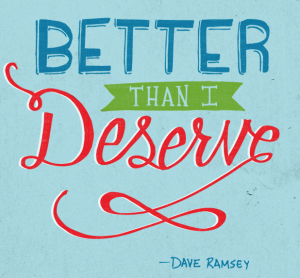“How are you today?” a caller asks Dave Ramsey. Ramsey responds without hesitation, “Better than I deserve.”
What do you deserve?
In Where is the Love? Nicholas Kristof laments the erosion of empathy for the poor, which he receives in the form of comments on his blog and Facebook page. Behind comments like, “Why should I have to subsidize someone else’s child? How about personal responsibility? If you procreate, you provide,” is a narrative about deserving. The commenter is persuaded that others don’t deserve his help, and that he deserves to use his resources in the way that he chooses. If you asked him how he’s doing today, his honest answer would probably be, “Not as well as I deserve!”
Responsibility and Flourishing
Despite his lack of empathy, I’m not going to throw this commenter under the bus. Perhaps unwittingly, he has intuited something very, very important. In flourishing societies and healthy communities there is always and without exception an individual and community awareness and conviction of the right connection between responsibility and reward, and between irresponsibility and pain. Let’s call it the “What you sow, you shall reap” principle.
One of the most critical roles that parents play in early childhood is to solidify this pattern in the experience of their children. To the degree that children experience the Sowing and Reaping principle, they will be prepared to develop appropriate civic responsibility and concern – first in the family, then in their community, and in wider society. If this conviction collapses, so does the wellbeing of individuals, families and communities – and their individual virtue and civic justice.
Broken from the Beginning
At present, many children (predominantly poor) are born into environments where this conviction has already collapsed. Their most tender, formative experiences teach them that the Sowing and Reaping principle is not true. In the home, words don’t correspond to actions. Mommy says, “If you do that one more time, we’re leaving,” six times . . . and instead of leaving, Mom smacks the child. Or consider the young babydaddy. In his experience, the costs and responsibilities of being a father are significantly, if not completely, severed from the pleasures of sexual promiscuity.
Kristof argues that we ought to have particular compassion on children born into these circumstances.
Do we really think that kids should go hungry if they have criminal parents? Should a little boy not get a curved spine treated properly because his dad is a deadbeat? Should a girl not be able to go to preschool because her mom is an alcoholic?
Each of these should questions is a question of deserving. Do kids deserve the pain of their parents’ actions? This rhetorical argument assumes the Sowing and Reaping principle: these kids haven’t done anything yet to deserve their bad lot.
Here’s the rub. The poor, under-educated parents of these children in all likelihood were formed in a similar environment. They received what they pass on to their children culturally as well as genetically. [For more on this, see my piece on Institutional Illegitimacy.] At the same time they are both perpetrators of brokenness on their children, and victims of their own broken families and communities.
The Moral Ecology of the Family
It is difficult to overstate the influence – for good or for ill – of the moral ecology of the family. We have already seen how disastrous a distorted moral ecology can be for children born in poverty. Kristof points out: “One University of Minnesota study found that the kind of parenting a child receives in the first 3.5 years is a better predictor of high school graduation than I.Q.”
But consider the children of Kristof’s commenter. How does the moral ecology of his family shape his children to steward the cultural power that they inherit? Does it tend to humility, mercy and grace? Does it catalyze empathy, service and care? A mere awareness of the Sowing and Reaping principle does not make for virtuous citizens or thriving communities.
Grace is the foundation of a flourishing society
Nicholas Kristof is absolutely right that we, the advantaged, need to grow in empathy. We need to get to know our neighbors, and to actively seek to see through their eyes. But we need more than that. We need a deep awareness of the Christian doctrine of grace if we are to care for them.
Dave Ramsey’s answer to the question, “How are you?” manifests an awareness of grace – not “random chance.” The awareness that we who have wealth, health and thriving relationships receive them by grace crushes both our selfish sense of entitlement, and our grudging of good things to others, who like us, don’t deserve them.
Questions: What good things have you received by grace? How have you been able to give ungrudgingly to others? Where have you seen beauty among the poor that inspires you?
